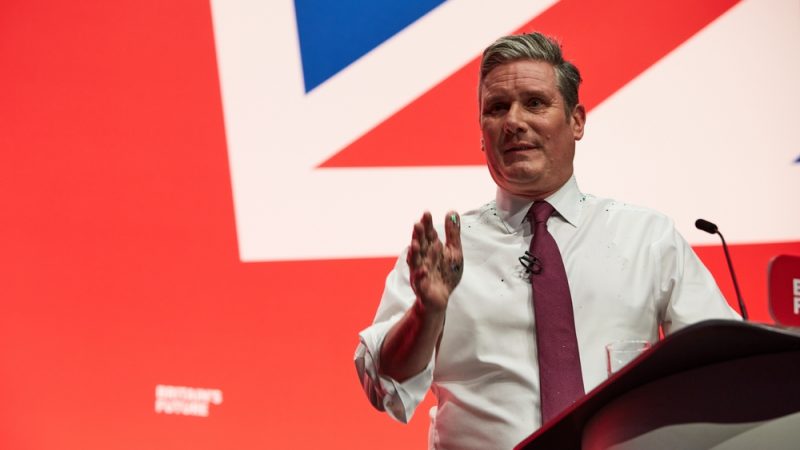
After Caerphilly, Westminster has fallen into one of its more comforting debates. How far Labour should tack left, build a progressive coalition, and rediscover its moral purpose. But that’s the wrong lesson, not just from the by-election, but from the first almost eighteen months of this government.
Labour came into office on a huge mandate for change and a promise of national renewal. The inheritance was awful. Few governments have started with less and been expected to do more. But Labour asked for this. It went to the country and said it could fix it. That was the deal.
READ MORE: Public trust Keir Starmer far more than Farage to keep NHS free – poll
And, as I’ve argued before, it came in without a plan for governing. Within a year, the talk had shifted from ‘change’ to ‘incremental change’, followed by a pattern of u-turns, retreats and resets. Few can recall a single week when it felt like the government was on the front foot.
Voters still back Labour’s priorities – they just don’t think Starmer does
The government’s uncertain start hasn’t gone unnoticed beyond Westminster. Our new polling shows a country unsure what its Prime Minister really wants to do. In research The New Britain Project conducted with More in Common, we set out to test whether the public has a clear sense of what Keir Starmer actually stands for. Voters were asked what they want from government, and then what they think the Prime Minister himself really wants to do on a series of litmus-test issues. The results are telling. Most people say they like what Labour claims to stand for, pride in Britain, tougher action on crime, lower immigration, but fewer than half believe Starmer genuinely shares those instincts.
By contrast, when we put the same questions to voters about Nigel Farage, there was no such confusion. People may dislike what he says, but they are absolutely certain about what he believes.
Rebuilding the social contract is the narrative this government has been missing
To counter this, Labour’s task is to speak with conviction, to show it truly believes what it says. That doesn’t mean sounding more like Farage. The public overwhelmingly wants immigration to come down. But Labour must confront the issue not because of electoral pressure, or because it’s a problem people merely think exists. It should confront high levels of immigration because it is a problem, and because there’s a Labour argument for fixing it – one where control protects fairness and compassion, rather than contradicting them. Managing borders and strengthening social cohesion should be central to Labour’s sense of purpose.
The same doubts run through the government’s approach to crime and antisocial behaviour – promises made, plenty of tough talk, but little to show for it. An astonishing one in four people think the Prime Minister would prefer a softer approach to crime, a view shared by only 4% of the public. People see it every day; shoplifters facing no consequences, muggers snatching phones, and rightly, they start to wonder whose side the system is really on.
Subscribe here to our daily newsletter roundup of Labour news, analysis and comment– and follow us on Bluesky, WhatsApp, X and Facebook.
What links all of this – the uncertainty, the frustration, the drift – is fairness. Or more precisely, the sense that the social contract has broken down. People feel like they’re doing their bit, but the system isn’t holding up its end of the bargain. Immigration and, I would argue, crime and almost every other issue that dominates our politics, has become shorthand for a system that feels rigged against the people who work hard, pay their taxes and get increasingly little in return. It leaves people feeling like mugs. They follow the rules while so many others seem not to have to.
Fairness, control, pride in Britain are not right wing slogans
This is the real Labour argument for getting serious: a return to what it claimed to stand for in the first place – fairness, control, pride in Britain. These are the foundations of a functioning country, and the basis of a renewed social contract.
Share your thoughts. Contribute on this story or tell your own by writing to our Editor. The best letters every week will be published on the site. Find out how to get your letter published.
That’s why the idea that Labour’s answer lies in a coalition with greens, nationalists, and the far left is self-defeating. Voters already agree with the priorities Labour has set out. The challenge is they no longer believe this government has the ability or intent to deliver them. Unless that changes, all the moral purpose in the world won’t save it.
-
- SHARE: If you have anything to share that we should be looking into or publishing about this story – or any other topic involving Labour– contact us (strictly anonymously if you wish) at [email protected].
- SUBSCRIBE: Sign up to LabourList’s morning email here for the best briefing on everything Labour, every weekday morning.
- DONATE: If you value our work, please chip in a few pounds a week and become one of our supporters, helping sustain and expand our coverage.
- PARTNER: If you or your organisation might be interested in partnering with us on sponsored events or projects, email [email protected].
- ADVERTISE: If your organisation would like to advertise or run sponsored pieces on LabourList‘s daily newsletter or website, contact our exclusive ad partners Total Politics at [email protected].




More from LabourList
‘Tackling poverty should be the legacy of Keir Starmer’s government’
‘The High Court judgment brings more uncertainty for the trans community’
‘There are good and bad businesses. Labour needs to be able to explain the difference’